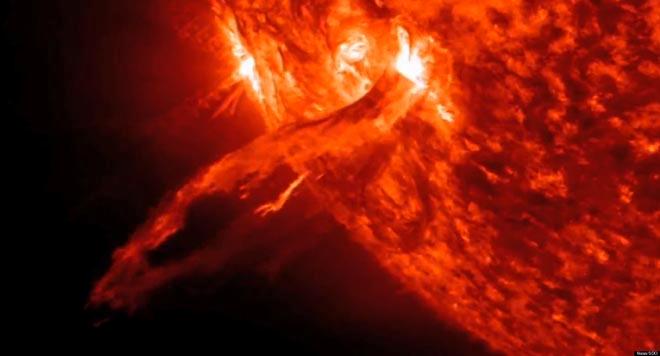Solar flares and lack of satellites threatens GPS reliability
by Des Ryan on 7 Jun 2013

Solar flare - photo by NASA SW
Governments have warned that 2013 could see a peak in solar flares. What's the relevance for sailors? Your GPS could be affected. And that's not the only thing pointing to the necessity of taking paper charts when you cruise. There's the US Navy's inability to replace all of their 24 satellites.
Solar Flares:
Solar flares follow a roughly 11-year cycle. The last maximum in activity came in 2000. May this year saw the most active solar flares in this sun cycle so far. The cycle began in 2008 and will last until 2019. Four high-strength flares occurred May 13 into May 14.
'Basically, this is as busy as the Sun has been in a 24-36 hour period since 2004,' said AccuWeather.com Astronomer Mark Paquette.
AccuWeather astronomer Hunter Outten said that these impressive flares have been responsible for disrupting a variety of satellite communications, even causing some blackouts that have lasted from nine to 25 minutes. Cell phones, radios and GPS devices can all be affected by solar flare radiation.
X-rays from solar flares are stopped by the atmosphere, but can affect satellites that orbit the Earth and hence GPS signals.
And it could have been worse. These flares were not earth directed. Earth-directed flares can cause charged particles in the atmosphere that can create auroras 24 to 36 hours after the blast. This could leave the cruising sailor dependent utterly on GPS technology with a problem. At best, if the last fix was recorded in the log as it should be, he/she would be relying on dead reckoning until the signal was restored, and at worst the yacht would be lost, potentially dangerously, depending on the location.
UK's Maritime Coastguard Agency (MCA) have also advised that maritime navigation systems and services that rely on the Global Navigation Satellite System(GNSS) are at greatest risk of disruption from the ionosphere during the period from 2012 to 2015. The intensity of the radio flux during the solar peak may be less than in previous peaks and the impact on GNSS may on average be less severe. However, even during a quieter solar maximum, the occurrence of individual sun spots could give rise to significant effects for discrete events. The effects vary with latitude, season and time of day (the hours soon after sunset being most affected). It is also worth noting that during the last solar maximum in the year 2000 the level of dependence on GNSS was quite low, whereas it is now very high.
Not enough satellites?
The US Air Force which is responsible for GPS acquisition, is in the process of modernizing GPS. The US Government Accountability Office(GAO) has issued some worrying warnings in the past, some of which are still current.
They assessed progress in (1) acquiring GPS satellites, (2) acquiring the ground control and user equipment necessary to leverage GPS satellite capabilities, and evaluated (3) coordination among federal agencies and other organizations to ensure GPS missions can be accomplished.
The outcome is that they are uncertain whether the Air Force will be able to acquire new satellites in time to maintain current GPS service without interruption. If not, some military operations and some civilian users could be adversely affected.
The facts presented in the GAO report show that there is some risk that a full set of 24 GPS satellites will not be able to be maintained from 2010-2016, due to late delivery of replacement satellites.
If you're wondering about other systems filling the gap, Galileo is unlikely to provide sufficient satellites to fill the gap left by a reduced GPS constellation. The Galileo schedule and associated regulatory activities will bring only limited benefit for maritime GNSS availability within the 2014 timeframe. However the GLONASS constellation is fully populated and providing global coverage and we would expect to see the full benefit of using GPS and GLONASS combined, once the whole GLONASS constellation has been updated to provide CDMA signals.
To be able to understand what will happen if there are only 23 satellites, we need to think about what kind of a gap this creates. Each satellite takes 11 hours 58 minutes to orbit, following the same path day in, day out. It has three other satellites following it on the same orbit. So there are 4 satellites equidistantly spaced on the same orbit (or sometimes more than 4 if there are more than 24 GPS satellites in operation). This is then duplicated to give 6 sets of these 4 satellites orbiting on 6 paths around the world.
So if one of the 24 fails, and is approaching your location, there will be a 2 hour 59.5 minute delay until the following active GPS satellite on the same orbit appears (albeit this is actually a little more complex due to the rotation of the earth). Whilst you're waiting you are will experience a comparative drop in GPS accuracy. This will happen twice a day and may result in difficulty in obtaining an initial fix when you first turn on.
Between these competing GPS issues and the fact that, while the GPS might be accurate, the chart it relies on may not be so accurate, it still behooves the prudent sailor to ensure they have another system of navigation in place to counter an GPS reliability, particularly in when sailing in close quarters.
If you want to link to this article then please use this URL: www.sail-world.com/110259